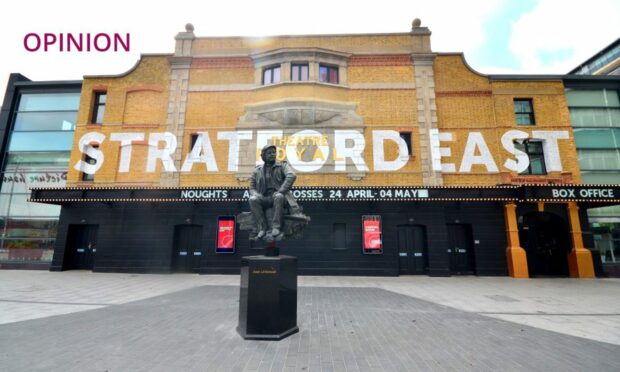When historian Dr David Starkey told me that his wonderful but monstrous mother “crawled over people like a caterpillar”, I couldn’t help thinking that the apple didn’t fall far from the tree.
My suggestion that he was the rudest man in Britain was met without outrage, but with mild semantic correction: no, he was the plainest-speaking man in Britain.
His speech had a kind of sonorous articulacy that was quite startling, particularly when he described his lascivious nights on Hampstead Heath in the late 1970s, drawing on allusions to A Midsummer Night’s Dream to describe “the trees, the leaves, the fruit, the boys”.
The point is that his facility with language suggests he knows exactly what he’s saying – whatever his wide-eyed protestations afterwards.
Starkey has an unerring instinct – fully exercised of late – for the shocking soundbite. Last month, he suggested Rishi Sunak was not fully engaged in the coronation because he was not steeped in “our” British values.
Then, last week, he told the National Conservatism Conference that “people” – who David? – are trying to equate slavery with the Holocaust and Jews are, therefore, under attack because of some bizarre kind of trauma “jealousy”, all of which requires a very big gulp indeed, even to type.

Starkey has form, having said, in 2020, that slavery wasn’t genocide, otherwise there wouldn’t be “so many damn blacks in Africa or in Britain”. He later apologised, saying his terminology was “a bad mistake”, but it didn’t stop him a year later from saying that the Rochdale grooming gangs were acting within the values of “the Punjab”.
He insists freedom of speech should include conversations about race, which is true, but it’s a shame all our conversations seem stuck in a time warp.
Take the Theatre Royal Stratford East, in London. The company has announced a one-off “Black Out” performance of Tambo & Bones, a comedy about America’s racist past. Organisers say this will allow a black audience to explore issues, “free from the white gaze”. Do we even need to discuss why that phrase is objectionable? Not to say self-limiting, like performing The Vagina Monologues free from the male gaze. Nothing like preaching to the converted.
The black community is divided on ‘black out’ performances
There is a horrible irony about political theatre, written to expose the injustices of social exclusion on the grounds of race, excluding another race from the performance. Whatever happened to collaboration and shared perspectives?
The response of feminists to all-male golf clubs, after all, wasn’t to say: “It’s fine, as long as you create all-female ones.” It was to say: “Stop taking gender as the only defining characteristic of our personality and humanity.” The same applies to race.
Find out more about the BLACK OUT performance of TAMBO & BONES here: https://t.co/wkY9XIp6bL pic.twitter.com/adJhwHBkpQ
— Stratford East (@stratfordeast) May 22, 2023
Is it conceivable that an all-white production could run, excluding black audience members? Or that the Royal Shakespeare Company would perform The Merchant of Venice for an all-Jewish audience to discuss antisemitism – just amongst themselves?
Organisers of Tambo & Bones say it is important to create a “safe space” for a black audience, but even the black community is divided. Sir Trevor Phillips, former head of the Commission for Racial Equality, defended the plan, saying he’d like to go. But the UK’s first black police and crime commissioner, Festus Akinbusoye, urged cancellation, saying the move sets “a poor and dangerous” precedent.
Are we never done with boxes and labels?
In the 1960s, signs in private accommodation openly decreed: “No Blacks. No Dogs. No Irish.” In Wole Soyinka’s poem, Telephone Conversation, he “confesses” his African nationality when trying to rent accommodation over the phone. The landlady has a question: “Are you light or very dark?” That was 1963. Sixty years later, it could be a discussion between the royals and Meghan Markle.
David Starkey told me money brought responsibility, but he had none whatsoever for ‘the yowling beggar on the street’
The excluded list never gets eradicated, just lengthened. No blacks. No whites. No papes. No prods. No gays. No Jews. No Europeans. (Rule Britannia!) No refugees. No addicts. No, no, no.
David Starkey told me money brought responsibility, but he had none whatsoever for “the yowling beggar on the street”. So, none of them either. Honestly. Are we never done with boxes and labels?
It’s a lucky bag, not a pick ‘n’ mix
Whether it’s public figures like Starkey, football spectators in Spain, the Glasgow teenagers involved in this week’s racist attack, or avant-garde theatre companies, it sometimes feels like we stay stuck in the same space, saying the same things in a slightly different way, objecting to more and more types of people. Why are THEY here? Who do THEY think they are?
What do you say to people who want children excluded from restaurants so they can “dine in peace”, or older people who want to live in villages from which young people are banned, or people who want to exist in social ghettos with white or black identikits who look just like themselves? Get a grip and get a life, is what I say.
Forrest Gump says life is a box of chocolates, but you don’t get to choose the contents. It’s a lucky bag, not a pick ‘n’ mix – and all the more interesting for it.
Catherine Deveney is an award-winning investigative journalist, novelist and television presenter, and Scottish Newspaper Columnist of the Year 2022

Conversation